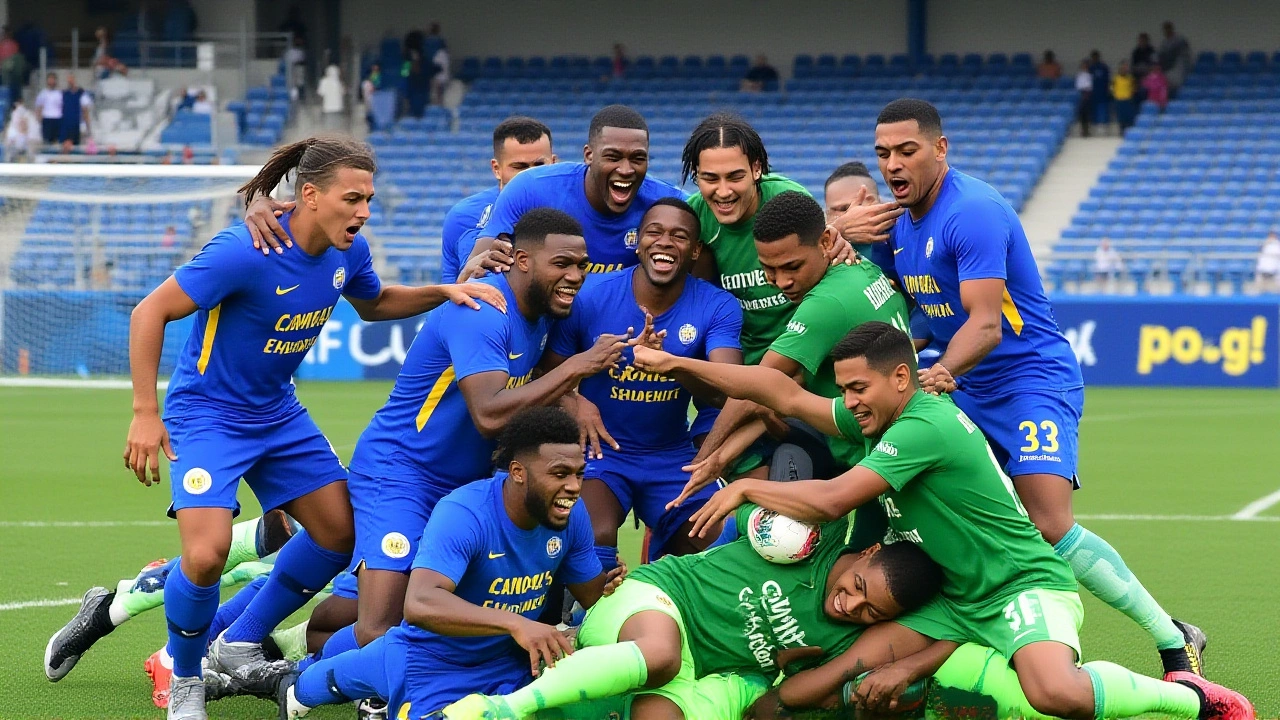Curaçao Becomes Smallest Nation Ever to Qualify for World Cup as Suriname Stuns in Final Match

On November 18, 2025, a 0-0 draw between Curaçao and Jamaica didn’t just end a qualifying match—it rewrote football history. With that result, the tiny Caribbean island nation, population just 165,000, became the smallest sovereign country ever to qualify directly for the 2026 FIFA World CupCanada, Mexico, and the United States. The moment wasn’t just emotional—it was seismic. For a place where football is more than sport, it’s identity.
History Made on a Rain-Slicked Pitch in Willemstad
The final whistle at the Estadio Curaçao in Willemstad didn’t roar with celebration. It hummed. A quiet, stunned silence, then a swell of horns, drums, and chants that echoed across the island. No goals. No heroics in the final minutes. Just discipline. Just grit. Under the guidance of 77-year-old Dutch legend Dick Advocaat, Curaçao held firm against a Jamaica side that needed a win to leapfrog them. The Reggae Boyz pushed. Curaçao held. And when the clock hit 90+4, the islanders had done the impossible.Advocaat, who’s coached the Netherlands, Russia, and South Korea, didn’t come to Curaçao for glory. He came because he believed in the talent buried under limited resources. "They don’t have academies like Europe," he told reporters after the match. "But they have heart. And heart doesn’t need a budget." His leadership turned a squad of semi-pros and diaspora players into World Cup contenders.
Suriname’s Miracle: A Goal That Wasn’t Supposed to Matter
While Curaçao celebrated, 1,200 miles away in Guatemala City, a different kind of miracle unfolded. Suriname, population 600,000, was losing 3-1 to Guatemala with six minutes left. Their World Cup dreams seemed dead. Then, in the 89th minute, substitute striker Stefan de Vrij—no relation to the Dutch defender—slipped a low shot past a tired keeper. The goal meant nothing in the context of the match… except it didn’t.Because of goal difference and head-to-head tiebreakers, that goal eliminated Honduras—a team that had dominated the group for months. The International Soccer Break crew, analyzing the match live, captured the absurdity: "It’s all thanks to a garbage time goal that you thought was meaningless… but Suriname will be at that playoff in March in Mexico." The goal didn’t win the match. But it won Suriname a lifeline.
Now, Suriname joins Jamaica in the FIFA inter-federation playoffsMexico, where they’ll face teams from Asia, Africa, and Oceania for two final World Cup spots. It’s a long shot—but for a nation that last qualified in 1990, it’s a miracle.
Haiti Breaks a 50-Year Curse
On the same day, in San José, Haiti ended a half-century of heartbreak. A 2-0 win over Nicaragua wasn’t pretty—but it was historic. Their last World Cup appearance? 1974. A generation of Haitians grew up watching the tournament without ever seeing their team play on the biggest stage. Now, they’ll be in 2026. "This isn’t just football," said goalkeeper Jean-Jacques Pierre after the match. "It’s hope. For kids in the slums. For families who lost everything in the earthquake. We carry them on our backs."Meanwhile, Panama sealed Group A with a 3-0 rout of El Salvador, while Costa Rica—once a regional powerhouse—was eliminated after a 0-0 draw with Honduras. The old order is cracking. The new faces? The small ones.

Why This Matters Beyond the Pitch
Curaçao’s qualification isn’t just a sports story. It’s a political one. As a constituent country of the Kingdom of the Netherlands, it has no FIFA voting power. No seat at the table. But now? They’ve got a seat at the World Cup. And that changes everything.For decades, CONCACAF was dominated by the U.S., Mexico, and Costa Rica. Now, with Curaçao, Suriname, and Haiti all qualifying—two of them through sheer resilience—the region’s hierarchy is shifting. It’s no longer about resources. It’s about belief.
The CONCACAF, headquartered in Miami, now has to reckon with this new reality. These aren’t minnows. They’re challengers. And their stories—of diaspora players returning home, of coaches taking risks on forgotten nations, of fans singing in Creole and Papiamento under floodlights—will inspire a generation.
What’s Next? The Road to Mexico
Curaçao will prepare for June 2026 with a training camp in the Netherlands, where Advocaat will bring in Dutch youth coaches to help fine-tune their set pieces. Suriname, meanwhile, is scrambling to secure international friendlies—any match that can give them exposure before March’s playoffs.Both nations now face the same question: Can they compete with teams from Asia and Africa who’ve spent years building professional leagues? Suriname’s coach, Wesley Sneijder (yes, *that* Sneijder), says yes. "We don’t have money. But we have hunger. And hunger beats money every time."
And if Suriname pulls off a playoff win? They’ll become the smallest nation ever to play in a World Cup match. That’s not just history. That’s legend.
Frequently Asked Questions
How did Curaçao qualify despite having such a small population?
Curaçao qualified by finishing first in CONCACAF Group B with seven points from six matches, thanks to disciplined defending and strong home performances. Their 0-0 draw against Jamaica on November 18, 2025, sealed top spot. With only 165,000 residents, they’re now the smallest sovereign nation ever to reach the World Cup finals, surpassing Iceland’s 2018 qualification (population 340,000).
Why was Suriname eliminated despite winning their final match?
Suriname didn’t win their final match—they lost 3-1 to Guatemala. But because Honduras also lost to Jamaica on the same day, and Suriname had a better goal difference and head-to-head record against Honduras, the late goal gave Suriname enough points to leapfrog Honduras into second place. It was a rare case where a loss still advanced a team due to tiebreaker rules.
Who is Dick Advocaat and why is his role so significant?
Dick Advocaat is a 77-year-old Dutch coaching legend who managed the Netherlands national team and clubs like PSV and Zenit. He took over Curaçao in 2023 with no salary, motivated by passion. His tactical discipline and ability to unify a scattered diaspora squad—players from the Netherlands, the U.S., and Europe—transformed Curaçao from underdogs into World Cup qualifiers. His leadership is the backbone of their success.
What does Suriname’s playoff path look like?
Suriname will face one of the second-place finishers from Asia, Africa, or Oceania in a single-leg playoff in March 2026 in Mexico. The draw hasn’t been made yet, but potential opponents include Syria, Senegal, or New Zealand. A win means a spot in the 2026 World Cup. A loss ends their dream—but even reaching this stage is a historic breakthrough for a nation that’s only qualified once before, in 1990.
Why is Haiti’s qualification such a big deal?
Haiti hadn’t qualified for a World Cup since 1974—50 years of political turmoil, natural disasters, and underinvestment in football. Their 2-0 win over Nicaragua on November 18, 2025, was their first World Cup qualification since the 1970s. It’s a symbol of resilience for a nation that’s endured decades of hardship. Their team, mostly made of players from the diaspora in Canada and France, carried the hopes of millions.
Will Curaçao and Suriname have a chance in the World Cup group stage?
It’s unlikely they’ll advance from their group—most World Cup groups include powerhouses like the U.S., Brazil, or Spain. But history shows underdogs can shock: Croatia in 1998, Senegal in 2002, Costa Rica in 2014. Curaçao’s defense, organized under Advocaat, could hold firm. Suriname’s attacking spirit might surprise. Even one point would be a triumph. The goal isn’t just to compete—it’s to prove that size doesn’t define potential.
